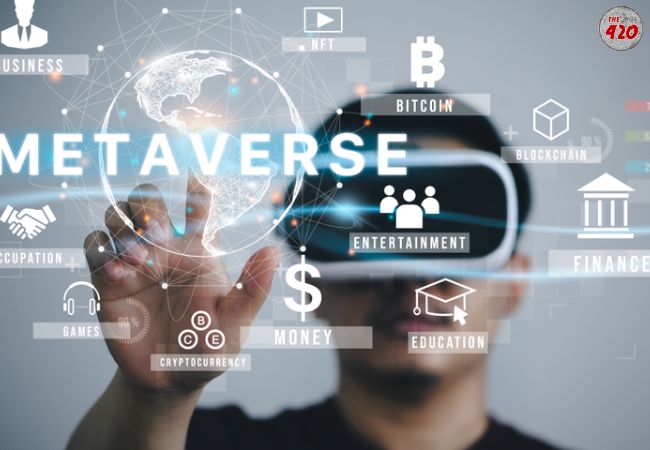Policy Watch
Metaverse And Its Cyber Security And Legal Complications

What is Metaverse?
The Metaverse is a virtual shared space that combines elements of augmented reality, virtual reality, the internet, and online gaming technologies. It is envisioned as a collective virtual universe where users can interact, socialize, share experiences, create content, conduct business, and more. The term was originally coined by author Neal Stephenson in his 1992 science fiction novel, “Snow Crash.” The Metaverse has gained recent attention due to advancements in technology and the growing interest in virtual environments for work, play, and communication. Major technology companies are investing in its development, hoping to build platforms and applications that will contribute to the growth of this immersive digital world.
Cyber Security Issues in Metaverse:
The Metaverse, as an interconnected virtual reality and digital space, introduces unique cybersecurity issues that can impact users, organizations, and developers. Some of the main cybersecurity concerns in the Metaverse include:
1. Data Privacy and Protection: With the increased amount of sensitive data being collected, data breaches, unauthorized data access, and data misuse become significant threats.
2. Identity Theft and Spoofing: Users risk their digital identity being stolen or impersonated, leading to consequences such as loss of assets, fraudulent activity, and false representation.
3. Malware, Ransomware, and Viruses: Malicious software and attacks by cybercriminals can interrupt services, lock out users or developers, and demand ransoms in exchange for restored access.
4. Phishing and Social Engineering: Cybercriminals may exploit trust, mimic legitimate entities, or use advanced social engineering tactics to gain access to sensitive information, credentials, or assets.
5. Smart Contracts Vulnerabilities: As smart contracts become more common in the Metaverse, their vulnerabilities and flaws can be exploited, leading to significant financial losses.
6. Distributed Denial of Service (DDoS) Attacks: As the scale of the Metaverse grows, attackers may target key infrastructure, leading to disruptions on a large scale.
7. Insider Threats: Rogue users or malicious developers may intentionally compromise systems or processes for personal gain, exposing the Metaverse to security issues.
8. Platform Security Risks: Flaws in software and hardware architectures (such as virtual and augmented reality devices) may create vulnerabilities that can be exploited by attackers.
9. Supply Chain Attacks: Cybercriminals can compromise components or software during the production or distribution process, resulting in security risks.
10. Legal and Regulatory Challenges: Ensuring global compliance and dealing with differing regulations among jurisdictions may pose challenges for companies operating within the Metaverse.
ALSO READ: Want To Become A Future Crime Researcher? Join The Future Crime Research Foundation
Let me elaborate present legal and regulatory challenges of Metaverse in detail. The metaverse is a virtual universe that integrates various digital environments, enabling users to interact through shared 3D spaces. As this technology gains traction, myriad legal issues will need to be addressed regarding security in the metaverse. Some of the legal concerns include:
1. Privacy and data protection: In the metaverse, individuals’ personal data may be collected, stored, and processed. Legal frameworks, such as the EU’s General Data Protection Regulation (GDPR) or the California Consumer Privacy Act (CCPA), will need to be applied to ensure appropriate data protection.
2. Intellectual property rights: User-generated content, trademarks, copyrights, and patents of digital assets must be protected within the metaverse. Governing these rights while respecting both the creator and the user’s rights will require nuanced legal frameworks.
3. Cybersecurity: Metaverse platforms will need to have robust security measures in place to protect users from cyberattacks, theft of digital assets, and data breaches. Regulators will need to create and enforce minimum cybersecurity standards across the entire metaverse ecosystem and address cross-border cyber threats.
ALSO READ: Cyber Crime Helpline By MHA: Now 155260 Is 1930 To Report And Prevent Cyber Fraud
4. Digital identity and authentication: The metaverse will likely rely on digital identities that link users to their real-world identities. Legal frameworks will be needed to govern the creation, validation, and management of digital identities, while also addressing issues like impersonation, fraud, and unauthorized access.
5. E-commerce and digital currencies: Transactions within the metaverse may involve virtual goods, assets, and currencies. Regulating these transactions, ensuring taxation compliance, and creating governance frameworks for the use of digital currencies will require legal oversight.
6. Content moderation and liability: The metaverse can become a breeding ground for harmful content or activities. Platform operators must moderate content, protect users from harassment, and prevent the spread of misinformation. Legal questions will arise around the responsibility of these operators and the extent to which they are liable for user-generated content.
7. Jurisdiction and cross-border governance: As the metaverse can be simultaneously accessed by users around the world, determining jurisdiction and resolving legal disputes will become complicated. Cross-border collaboration will be crucial for creating cohesive and comprehensive legal regimes.
8. Accessibility and discrimination: Ensuring equitable access to the metaverse and preventing discriminatory practices within this virtual world will necessitate appropriate anti-discrimination and accessibility laws.
Conclusion:

Addressing these cybersecurity issues will require the collaboration of companies, developers, users, and policymakers to develop and enforce strong security measures and create a safe online environment for everyone. As the metaverse develops, governments, regulators, and legal professionals will need to work together to create the necessary legal frameworks and guidelines that address these complex legal issues.
About the author: Jayjit Biswas – Founder Elite Web3 Forum
Follow The420.in on
Telegram | Facebook | Twitter | LinkedIn | Instagram | YouTube
